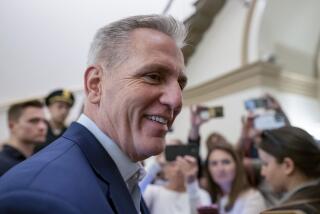Bush Asks Congress to Raise Debt Ceiling as Spending Nears Wall
- Share via
WASHINGTON — The Bush administration on Tuesday asked Congress to take prompt action to boost the government’s borrowing authority, a change needed to avoid the risk of defaulting on the national debt.
The Treasury Department said the government could hit the current debt limit in late February, because of the slow economy and increased spending after the Sept. 11, 2001, terrorist attacks.
The request, which came in a letter to key members on the traditionally low-key day before Christmas, could become politically charged when Congress resumes next year. Ultimately, however, lawmakers likely will approve it.
Even so, many Republicans pride themselves on fiscal conservatism and do not like being asked to vote to raise the debt ceiling. And House Democrats were nearly unanimous in voting against a boost last summer, saying President Bush should first reconsider parts of his tax-cutting plan. That increase was approved nonetheless, raising the borrowing limit by $450 billion, to the current $6.4 trillion.
“I’m sure they would have preferred to do this at midnight on Christmas,” said Henry Aaron, an economist at the nonpartisan Brookings Institution here, referring to the administration’s request.
In the letter to lawmakers, Deputy Treasury Secretary Kenneth Dam wrote that “the ongoing response to the Sept. 11, 2001, terrorist attack and the economic slowdown” were behind the need to raise the debt ceiling.
The government is spending more on defense and security, while the economic slowdown -- along with a fall in stock values -- has meant lower tax receipts.
“This action is necessary to ensure success in our efforts to combat terrorism, continue the economic recovery and create jobs, and maintain the soundness of federal government securities,” Dam wrote.
He did not request a specific figure for the new limit. A Treasury Department spokeswoman said that would be worked out with Congress.
Several economists said there was little that Bush could have done to avoid asking for a higher debt ceiling, because the economic turndown is largely beyond his control.
But they also said the request shows why, in their opinion, the Bush administration has been wrong to pursue long-term tax cuts, which they say will only add to the debt.
“It’s embarrassing,” Aaron said. “It underscores the total budgetary debacle that has occurred under President Bush’s watch.
“We have moved from projected multitrillion-dollar budget surpluses over 10 years to ... multitrillion-dollar deficits.”
Harry Zeeve, national field director for the Arlington, Va.-based Concord Coalition, an anti-deficit group, said the request for a higher debt limit “was yet another symptom of a disease: the loss of budget discipline.”
He said Congress should postpone tax cuts until the economic outlook improves, and that any prescription drug benefit for senior citizens should be tied to cost savings in the Medicare program.
The federal budget fell from a surplus of $237 billion in 2000 and $127 billion in 2001 to a deficit of $157 billion in the fiscal year that ended in September. The Congressional Budget Office foresees deficits at least until 2006.
Some say deficits will continue beyond that, however. The budget office projections are based on tax laws as they are currently written, and many economists believe those laws will change.
The president, for example, is expected to push for new tax cuts. He also wants to make permanent the $1.35 trillion in tax cuts that Congress approved last year. Under current law, those tax cuts will expire after 2010.
If the debt limit is not raised, the Treasury Department has several mechanisms available to stave off default on government bonds. The department already used some of those tools this year, such as borrowing from government retirement funds.
Democrats in Congress said the request for more borrowing authority showed that Bush was mismanaging the economy.
“This administration is in a state of deep economic denial,” said Senate Democratic leader Tom Daschle of South Dakota, criticizing tax cuts approved last year.
“They need to get serious and get a new economic plan now.”
More to Read
Get the L.A. Times Politics newsletter
Deeply reported insights into legislation, politics and policy from Sacramento, Washington and beyond. In your inbox twice per week.
You may occasionally receive promotional content from the Los Angeles Times.









